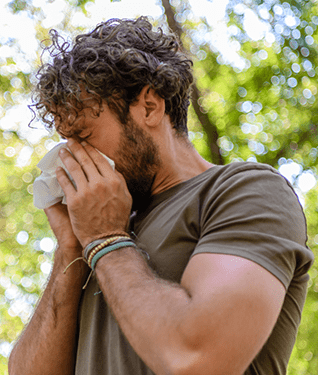Flu in the Summer
In America, we tend to think of the flu as something that occurs in the colder months of the year. But did you know that you can get the flu in the summer?
Influenza cases usually increase during the fall and winter months when the weather is colder and drier. The ability of flu to spread depends on cooler temperatures and lower humidity levels. However, several factors can drive the spread of flu in the summer.
International travel: Higher risk of exposure to the flu
People traveling to regions where flu activity is higher—or to places where different strains of the virus are circulating—can increase their risk of exposure and infection.
For example, Americans are used to experiencing flu season from October through April. However, if you’re planning on travel during the summer to countries such as Australia, Chile and South Africa in the Southern Hemisphere, you will find those countries are in the middle of their flu season, which runs from April to September. Additionally, flu strains that circulate in one hemisphere may be different from those that circulate in the other.
Getting flu in the summer may not be an issue if you are not traveling, but this depends on the flu strains that are circulating in your area. Due to antigenic drift, these strains may be different from the ones circulating during the fall and winter—so any flu vaccine you may have had in the fall may not cover those summer flu virus strains.
Travel tip: Stay informed and follow guidance. Before you travel, look up information on flu activity taking place at your destination. Review any travel advisories or recommendations that may have been issued by the Centers for Disease Control and Prevention (CDC) or the local health authorities at your destination. The CDC offers frequent updates on seasonal flu activity around the world.
Flu transmission risks in crowded indoor environments
Being in crowded areas with infected individuals increases the likelihood of getting the flu. Flu spreads mainly by droplets, which can travel up to 6 feet away when someone coughs or sneezes, so influenza can travel quickly in a crowd of people indoors. It is easy for flu to spread at mass gatherings of people at concerts, festivals, conferences and sporting events. People who catch the flu while attending these events can then spread it to other people in their families and communities.
The transmission of influenza can be due to having close contact with infected people, but flu viruses can also spread through the air. Air conditioning and fan usage in enclosed public spaces such as indoor shopping malls, movie theaters, and public transportation can provide relief from summer heat. However, reduced ventilation and recirculating air within indoor spaces like these can aid the transmission of infectious diseases, including influenza.
Even spaces that are only partly enclosed and have many people gathered together—such as cruise ships—increase the chances for flu to spread in the summer.
Travel tip: Take care when in crowds. The risk of flu transmission can increase during travel or participation in events involving in crowded places. If you are traveling to a place with a flu outbreak, practice social distancing whenever possible.
Taking protective measures against summer flu
If you’re familiar with the general recommendations on how to protect yourself against influenza, the steps you can take to protect yourself against getting flu in the summer will sound familiar. However, recommendations on preventing the summer flu includes a few additional details that can help you prepare for travel—and make the most out of your summertime experience.
1. Get vaccinated. Whether it’s the summer flu or the traditional seasonal flu, the most effective way to prevent influenza is by getting an annual flu vaccine. The CDC recommends that individuals aged 6 months and older receive the vaccine if they are eligible. Vaccination helps build immunity against the specific strains of influenza expected to circulate, reducing the risk of infection and complications. Immunity to the flu from a flu shot wanes over the course of the season as the circulating flu viruses mutate or different flu viruses begin to circulate. This is why flu vaccines are recommended annually.
If you haven’t had a flu shot for the current season and are going someplace that has flu activity, a flu vaccine will help protect you during your travels. (However, it’s important to know that flu shots for the current flu season typically expire the following June. New flu vaccines aren’t usually available until the fall.)
On the other hand, if you have been vaccinated for the flu during the current flu season, getting revaccinated for summer travel isn’t recommended. Because the effectiveness of a flu shot in the early fall may be lower by the following summer, it’s important to practice healthy habits that limit your exposure to the flu virus.
2. Practice good hygiene. Regular hand washing with soap and water for at least 20 seconds can go a long way in getting rid of viruses, especially before eating or touching the face; our eyes, nose, and mouth are entry points for viruses.
If you cannot access soap and water, use an alcohol-based hand sanitizers for disinfection on the go. The sanitizer must have at least 60% alcohol content.
In addition to regular hand hygiene, you should keep frequently touched surfaces clean and disinfected when traveling. Use disinfecting wipes or sprays to sanitize commonly touched objects like doorknobs, light switches, tray tables, and armrests. This practice can help minimize the risk of picking up the flu virus from contaminated surfaces.
A few other tips related to hygiene: Make sure to avoid close contact with sick individuals, and cover coughs and sneezes with a tissue or the crook of your elbow—not your hands.
3. Maintain a healthy lifestyle. Taking steps to strengthen your immune system can provide added protection against the flu, as well as and other kinds of infectious diseases. Maintaining a balanced, nutritious diet, exercising regularly and getting good sleep can help your body fight off viruses. (But remember, while a healthy immune system can help you fight off illness, it doesn’t necessarily give you complete immunity from the flu or other diseases.)
If you get sick with the flu while you’re traveling, you should be able to recover without medical care. If you develop severe flu-like symptoms or are at a high risk of complications from the flu, make sure you seek medical advice.
Although less common than during the traditional flu season, contracting the flu in the summer is possible. Understanding how the virus may spread and taking preventive measures can reduce the risk of infection. If you have an updated flu vaccine, practice good hygiene, maintain a healthy lifestyle and stay mindful of travel-related risks, you can protect yourself and others from the flu during summer travel. By keeping yourself up to date on the latest information on flu prevention and travel guidance, you can enjoy a safe and healthy summer season.

